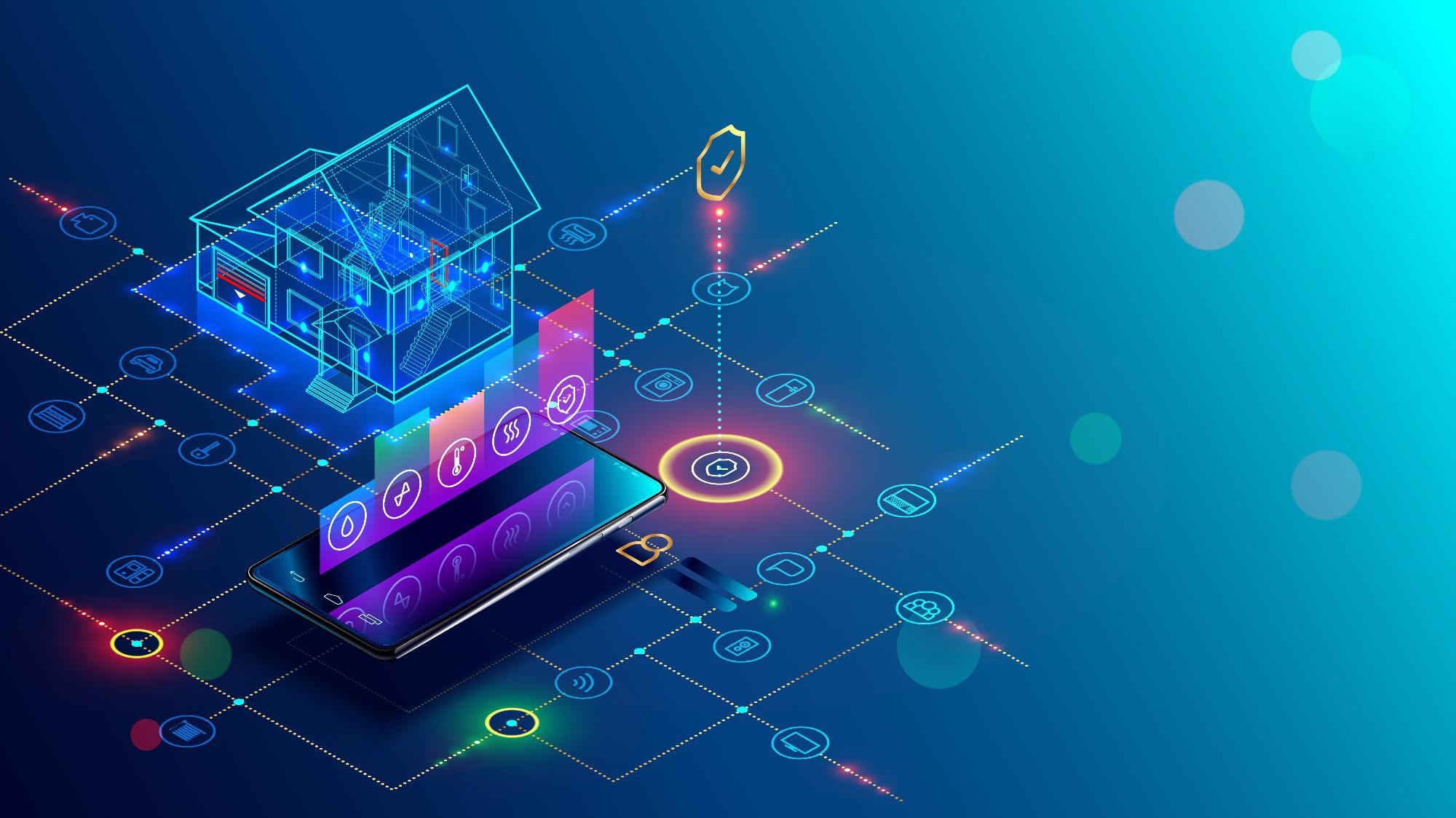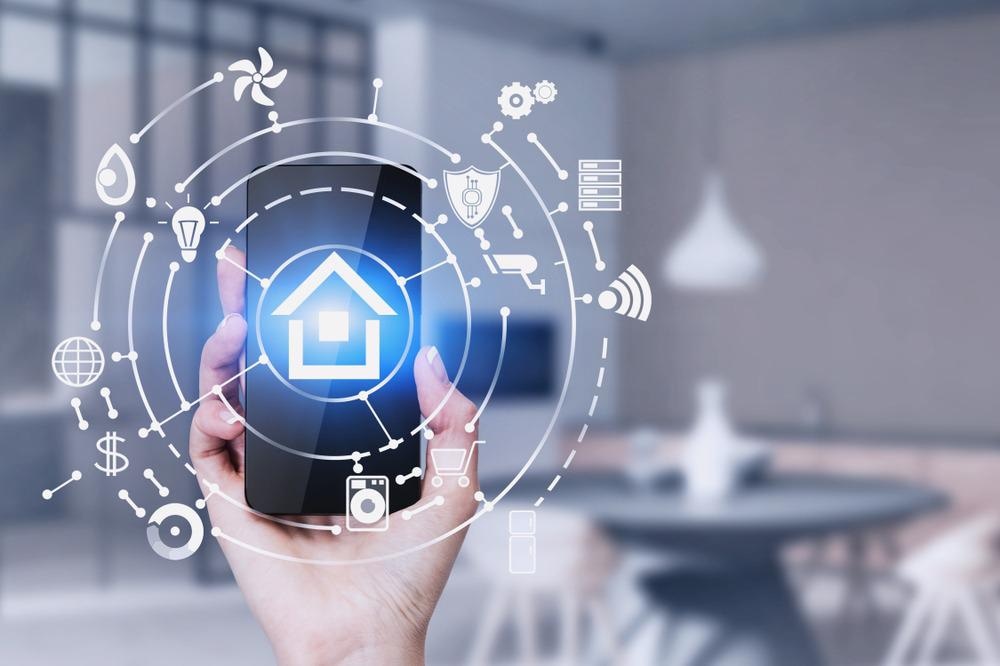Technology is consistently improving our quality of life. The internet of things, artificial intelligence, robots, and smart sensors will all feature in the houses of the future. This article will discuss how artificial intelligence will help to build smart homes.

Image Credit: Andrey Suslov/Shutterstock.com
What is Artificial Intelligence?
Artificial intelligence (AI) is a field of computer science that is concerned with creating advanced software that creates machines that think like humans. The concept goes back to antiquity, when philosophers attempted to describe and define human thought. However, it was not until the latter half of the 20th century that the term “artificial intelligence” was coined. This heralded the birth of modern AI.
A paradigm shift occurred with the advent of machine learning and neural networks. AI could finally start to learn in the same way that human brains do. Whilst some people see AI as an existential threat, many people agree that this emerging technology has overwhelming potential.
AI: Paving the Way for Smart Homes
AI has huge potential to change the very homes we live in. The type of AI that is employed in home systems is termed “Narrow AI”, and this type of technology is already used in other areas such as smartphones and search engines. Narrow AI is good at carrying out specific tasks, but it is not “human” intelligence.
We live in an increasingly connected, data-driven world, with countless points of data everywhere from appliances, human activity, browsing habits, and the built and natural environment. AI can collect and analyze multiple data points and use them to make decisions.
The ability of AI to monitor, analyze, and provide the best course of action based on this data makes it an integral part of the smart home concept. AI will contribute to time, resource, and energy savings in a transformative manner.
Energy Conservation
Current forms of energy-saving technology have their drawbacks. Insulation has air exchange issues. Energy-conserving materials can be expensive. Appliances are lacking in energy conservation capabilities.
AI will improve the energy conservation of homes. Smart meters and thermostats are already widely available. These devices monitor temperature and energy usage in the home and are widely touted as energy and money-saving appliances. Google Nest is an example of a commercially available smart thermostat that improves energy efficiency. Devices are set to become even smarter in the future.
Artificial intelligence can help monitor and break down energy consumption and identify problem areas such as operational stray. Smart sensors and AI can be installed in appliances, monitoring their performance, and feeding the data back to a central hub through an interconnected network.

Image Credit: ImageFlow/Shutterstock.com
Eventually, smart homes will be able to predict energy usage and patterns down to the second, providing superior energy conservation solutions.
A More Connected Home
Internet-connected devices are becoming more commonplace. The internet of things (IoT) will be a feature of smart homes. Connected refrigerators, fire alarms, and door locks are all on the market currently or under development. Integrating AI into these devices will help create a hyper-connected home where devices learn homeowner’s schedules and patterns.
IoT-connected devices, 5G and high-speed internet, smart voice assistants such as Alexa and Cortana, and a network of smart sensors around the home, all connected to a central hub with next-generation AI, will make the smart home of the future an interconnected place.
AI-enhanced homes will also be part of a smart urban ecosystem. Much like the roots of trees exchanging information, connected homes will share data to improve the lives of city dwellers in areas such as energy consumption, traffic management, and overcrowding.
Better Food, Less Waste
A refrigerator will be able to detect what food is running low and replace it automatically, and even learn to predict what type of food you are likely to buy. AI could suggest meals based on ingredients in stock in the home.
Facebook has developed an AI-based meal recognition system that helps users reverse engineer a recipe by merely taking a picture of a dish. Smart, AI-enabled refrigerators will be more energy efficient and help reduce food waste.
Personalized dishes will also become possible by storing biological data on an AI-enabled device. A smart kitchen could even prepare your meals for you. Moley are already developing a robotic kitchen, touting their robotic arms as being as skillful as a top chef.
Self-Repairing Homes
Smart homes will also be able to self-repair. AI will monitor structural integrity, and even run diagnostic tests to predict any issues before they occur, calling out a technician (who may even be an AI-enhanced robot.) Fuzzlab are already working in this area by collaborating with local authorities to provide AI-driven domestic repair schedules.
New Self-Healing and Durable Concrete Materials Could Reduce Maintenance Repairs
Improvements in Resident’s Health
The Apple Watch already has features which can monitor health. Through a network of biological sensors, both remote and wearable, smart homes will be able to monitor resident’s health and feed the data back to central medical servers.
This will help health care professionals to monitor and predict individual’s health risks. AI-enabled systems will be able to monitor medication levels and automatically order a new prescription when needed, ensuring patients never run out.
Concerns
However, there are some concerns with smart homes. The main concern is security of devices. A savvy-enough hacker could probe for exploitable parts of the system to provide a back door into it, especially if security protocols are not kept up to date. Another concern is that data could be sold to companies. The Cambridge Analytica scandal is testament to the harmful potential of selling harvesting huge datasets.
The Future
The IoT market alone is predicted to grow to around $1.6 trillion by 2025. With the global AI market set to be worth $997.77 billion by 2028, the next decade will see AI become eminently more commonplace.
The Status Quo is undergoing a rapid change as the world adapts to the challenges of the 21st century, such as climate change and the pandemic: the future will become vastly more connected and consumer tastes are shifting in favor of these new technologies. The advent of smart homes is close.
References and Further Reading
Anyoha, R (2017) Can Machines Think? [online] sitn.harvard.edu. Available at: https://www.scirp.org/reference/referencespapers?referenceid=3561147
Vailshery, L.S. (2021) Global IoT end-user spending worldwise 2017-2025 [online] statista.com. Available at: https://www.statista.com/statistics/976313/global-iot-market-size/
Saberi, O & Menes, R (2020) Artificial Intelligence and the Future for Smart Homes [online] IFC.org. Available at: https://www.ifc.org/wps/wcm/connect/6fc5b622-05cb-4ee9-b720-ab07591ac90e/EMCompass-Note-78-AI-Smart-Homes.pdf?MOD=AJPERES&CVID=n0S3dro
Alexander, D (2020) 9 Ways Artificial Intelligence Can Help Make Your Time at Home More Fun [online] interestingengineering.com. Available at: https://interestingengineering.com/9-ways-artificial-intelligence-can-help-make-your-time-at-home-more-fun
Disclaimer: The views expressed here are those of the author expressed in their private capacity and do not necessarily represent the views of AZoM.com Limited T/A AZoNetwork the owner and operator of this website. This disclaimer forms part of the Terms and conditions of use of this website.